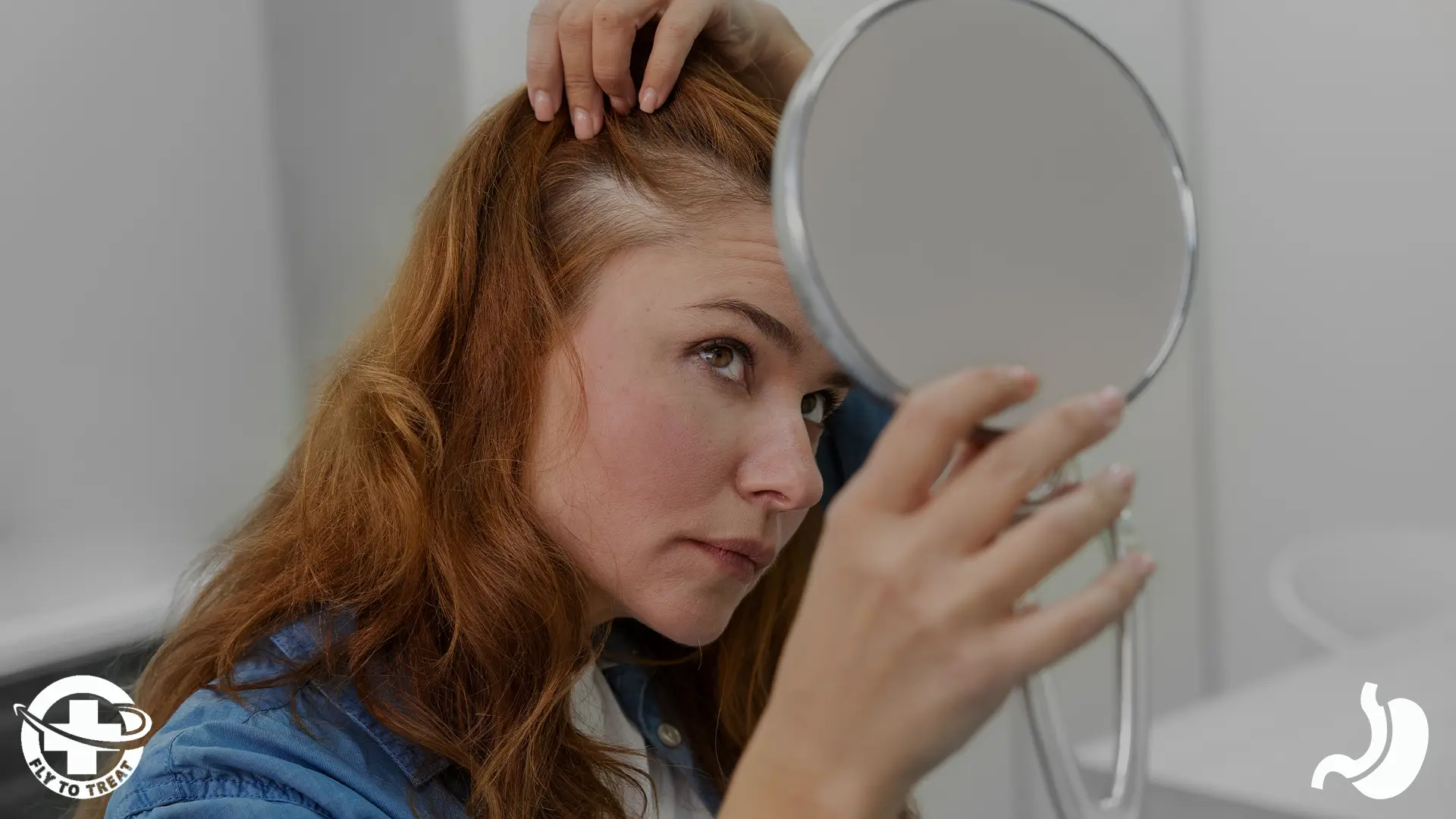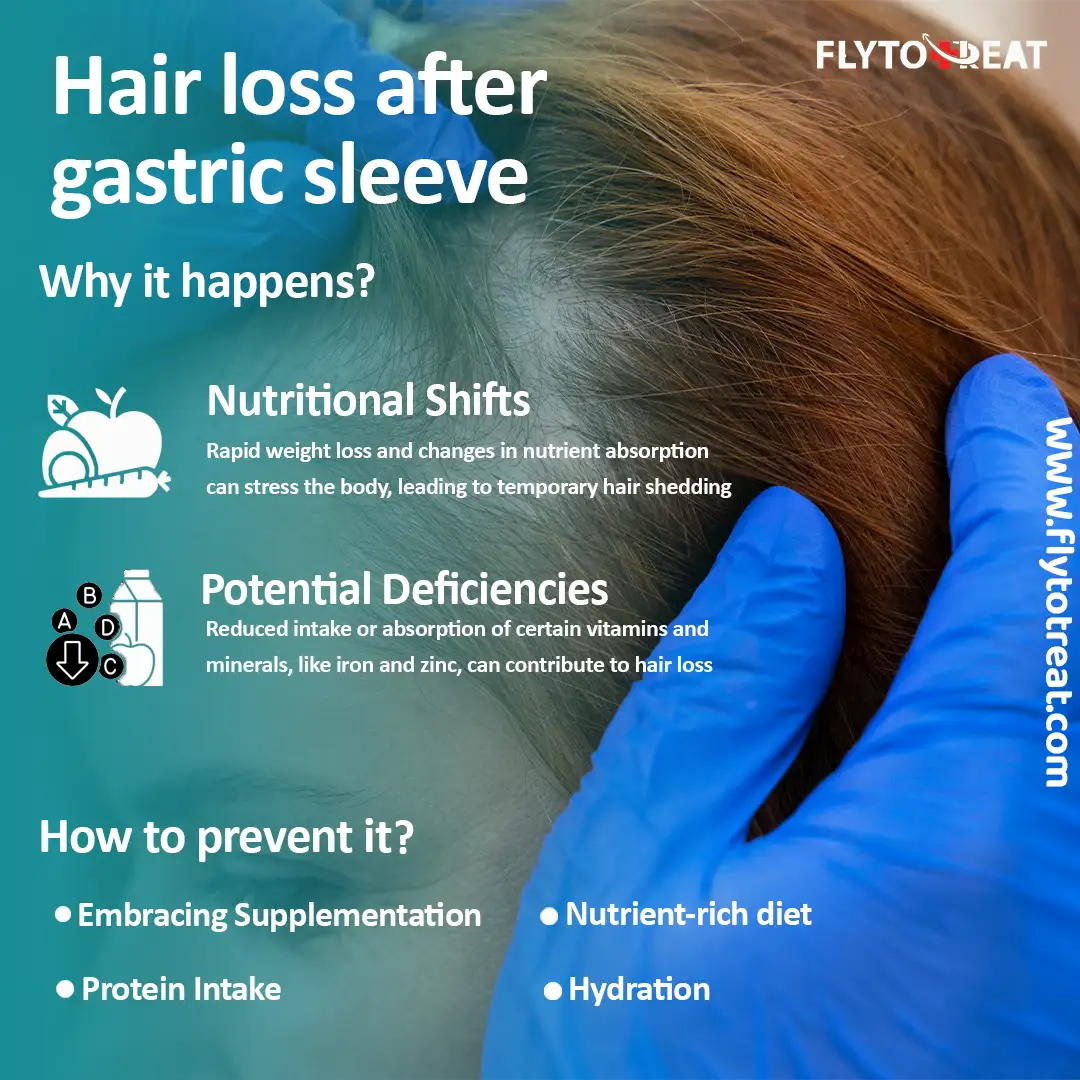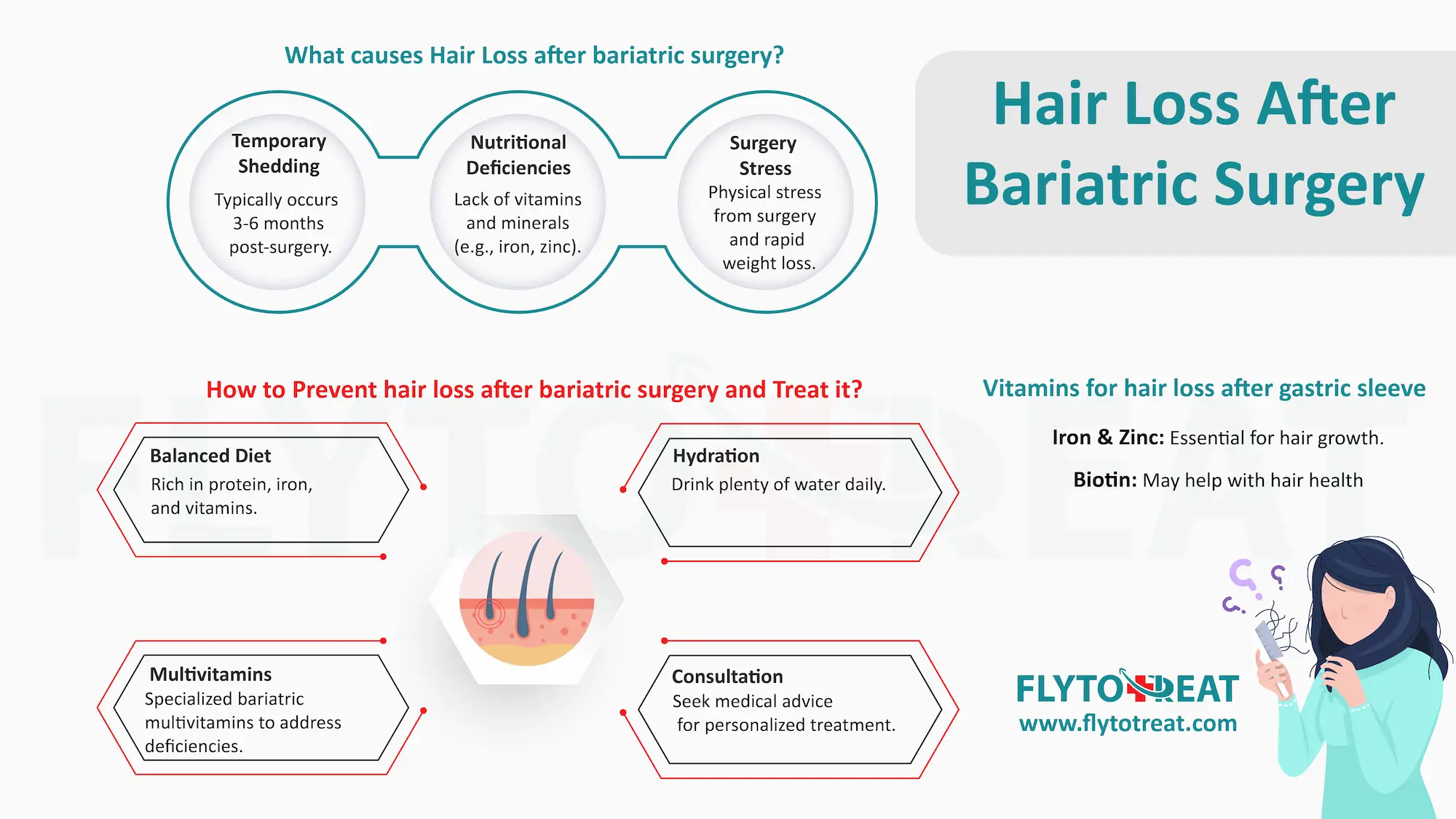
How to stop hair loss after gastric sleeve?
Gastric sleeve surgery hair loss is a notable concern for many individuals undergoing this form of bariatric surgery. But, Will hair loss after the gastric sleeve grow back? Does everyone lose hair after gastric sleeve? How to stop hair loss after gastric sleeve? Here we’ll answer these questions and explore what you need to know about sleeve surgery and hair loss. FlyToTreat recognizes the impact this side effect can have on patients, both physically and emotionally. This document aims to provide essential information on how to manage and mitigate hair loss effectively, ensuring that patients not only achieve their health goals but also maintain their overall well-being during the post-surgery period.
Gastric sleeve hair loss
Hair loss is a common concern after bariatric surgery, particularly procedures like sleeve gastrectomy. This can have multiple reasons. Here's what you need to know:
• Temporary Shedding: Increased hair shedding is often temporary, typically occurring 3-6 months after surgery.
• Stress and Nutritional Shifts: The body's response to surgery and significant weight loss can trigger hair loss as it prioritizes vital functions. Nutritional deficiencies, if present, can also contribute.
• Not Permanent: In most cases, hair loss stops after several months and hair growth resumes its normal pattern.
Remember: Post-bariatric hair loss is usually temporary. If you're concerned or experience excessive shedding, consult your doctor to rule out any underlying causes and discuss potential solutions.
Does gastric sleeve cause hair loss?
Gastric sleeve surgery, like other bariatric procedures, can be linked to temporary post-bariatric surgery hair loss. Here's why:
• Nutritional Shifts: Rapid weight loss and changes in nutrient absorption can stress the body, leading to temporary hair shedding.
• Potential Deficiencies: Reduced intake or absorption of certain vitamins and minerals, like iron and zinc, can contribute to hair loss.
Remember: Hair loss after sleeve gastrectomy is usually temporary, typically lasting 3-6 months. Focusing on a balanced diet, taking a bariatric multivitamin, and staying hydrated can help minimize shedding. If you experience excessive hair loss, consult your doctor to rule out any underlying causes. therefore for more information about what foods are forbidden after gastric sleeve?
Vitamins for hair loss after gastric sleeve
Bariatric surgery, like sleeve gastrectomy, can alter nutrient absorption. This can impact hair health, leading to temporary shedding. Here's how vitamins can help:
• Multivitamin: A daily bariatric multivitamin formulated for post-vbariatric surgery hair loss needs is crucial.
• Iron & Zinc: These minerals play a vital role in hair growth. Ensure your multivitamin includes sufficient amounts, or consider additional supplements if deficiencies are identified.
• Biotin: While research is mixed on its effectiveness for preventing hair loss after sleeve surgery, some studies suggest it may benefit those with a biotin deficiency.
Consult your doctor before starting any new supplements. They can assess your individual needs and recommend the right approach to support healthy hair growth after surgery. Here is a more comprehensive answer to the question of "What is the best vitamin to take after bariatric surgery?
Preventing hair loss after bariatric surgery
While temporary hair loss is common after bariatric surgery, there are steps you can take to minimize shedding and promote healthy hair growth, by following the best diet after gastric sleeve
• Nutrient-rich diet: Focus on a balanced diet rich in protein, iron, and vitamins. Lean protein sources, leafy greens, and whole grains provide essential building blocks for healthy hair.
• Embrace Supplementation: A daily bariatric multivitamin is key to addressing potential nutrient deficiencies contributing to post-bariatric surgery hair loss. Your doctor may also recommend additional supplements like iron or zinc if deficiencies are identified.
• Protein Power: Protein is crucial for hair growth. Aim for the recommended daily protein intake established by your doctor or bariatric team.
• Hydration Hero: Adequate water intake is essential for overall health, including hair health. Aim for eight glasses of water daily.
These tips can help, but some hair loss may still occur. Patience is key, as hair growth typically resumes its normal pattern within a few months. If you're concerned about excessive shedding, consult your doctor to rule out any underlying causes. Getting ready for gastric sleeve surgery can reduce the stress on your body and affect the amount of hair loss after sleeve gastrectomy.

Regrowing hair after bariatric surgery
While there's no single "best" treatment for post-bariatric surgery hair loss, a multi-pronged approach can significantly improve hair health:
• Prioritize a balanced diet of protein, iron, and vitamins. Lean protein sources, leafy greens, and whole grains provide essential building blocks for hair growth.A daily bariatric multivitamin is crucial to address potential deficiencies that contribute to hair loss. Your doctor might recommend additional supplements like iron or zinc if needed.
• Adequate water intake is essential for overall health, including hair health. Aim for eight glasses of water daily.Remember, hair loss after surgery is usually temporary, and growth typically resumes normalcy within a few months.
Additionally, consult your doctor: They can assess your situation and recommend if further treatments like topical minoxidil might be suitable for your case.
Hair loss 3 years after gastric sleeve
gastric sleeve hair loss typically occurs within 3-6 months after bariatric surgery like gastric sleeve surgery due to temporary nutritional shifts and stress on the body. Post-bariatric hair loss persisting for 3 years or 5 years or any other long-term period is less common. Here's what to consider:
• Underlying Conditions: While uncommon, hair loss three years after surgery could be a sign of an unrelated medical condition. It's important to see a doctor to rule out any underlying causes.
• Nutrient Deficiencies: Long-term deficiencies of iron, zinc, or other vitamins can contribute to hair loss. A blood test can identify any current deficiencies requiring adjustment to your diet or supplements.
• Long-Term Management: Even after the initial shedding phase of sleeve surgery hair loss, continued focus on a balanced diet, adequate hydration, and a bariatric multivitamin can promote healthy hair growth.
Consult your doctor. They can assess your situation, identify any potential causes, and recommend appropriate solutions to address your hair loss concerns.
The best shampoo for hair loss after bariatric surgery
While there's no magic bullet shampoo for post-bariatric surgery hair loss, focusing on overall hair health is key. Here's why:
• Nutrient Deficiencies: Hair loss is often linked to deficiencies caused by reduced nutrient absorption after surgery.
• Holistic Approach: A bariatric multivitamin and a balanced diet rich in protein, iron, and vitamins are more crucial than a specific shampoo for addressing the root cause of hair loss.
• Scalp Care: A gentle shampoo that cleanses without stripping your scalp's natural oils can be beneficial.
Consult your doctor about any hair loss concerns. They can assess your situation and recommend a personalized approach that might include a bariatric multivitamin, dietary adjustments, or address any underlying issues.
Hair thinning after gastric sleeve
Hair thinning is a common concern during gastric sleeve recovery, also known as post-bariatric surgery hair loss. Here's why it happens and what to expect:
• Stress Response: Rapid weight loss and surgery can stress the body, causing hair follicles to temporarily shift into a resting phase, leading to thinning hair.
• Nutrient Deficiencies: Reduced absorption of vitamins and minerals like iron, important for hair growth, can contribute to thinning.
• Temporary Issue: The good news is that hair thinning after gastric sleeve surgery is usually temporary, typically lasting 3-6 months. Hair growth resumes its normal pattern once the body adjusts.
Remember: A balanced diet, a bariatric multivitamin, and staying hydrated can help promote healthy hair growth and minimize thinning. If thinning persists beyond a year, consult your doctor to rule out any underlying causes.

conclusion
To wrap up, understanding and managing hair loss after gastric sleeve surgery is crucial for a full recovery and maintaining quality of life. FlyToTreat is dedicated to supporting patients through this process with practical advice and professional care. By implementing the strategies discussed, such as proper nutrition and appropriate hair care, patients can expect to see improvement in their hair health, aligning with their overall transformation after bariatric surgery.

MEDICALLY REVIEWED BY: Dr. Ali Bazazi
AUTHOR: FlytoTreat's team of Authors
14 April 2024 - Updated At: 12 August 2024
Related Articles
Comment





